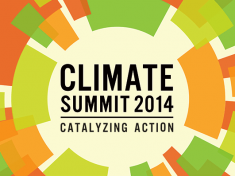Climate Change: There is No Plan B, Because There is No Planet B
- Article written by Javiera Espinoza, a Chilean geographer and environmental advocate with Fundación Terram. This article originally appeared in Spanish in El Dinamo. Translated from Spanish by Futaleufú Riverkeeper.
Last Sunday, September 21st, more than 600,000 people through nearly 2,800 events in 166 countries took to the streets to promote actions to stop the effects of climate change. The “People’s Climate March” aimed to get the attention of governments and demand they take decisive and drastic action on climate issues, making it the largest march to combat climate change in history. Without looking further afield, more than 400,000 people marched just in New York, including UN Secretary-General Ban Ki-Moon himself, as well as former United States Vice President Al Gore. It is precisely in this city where the United Nations General Assembly is meeting this week, during which Ban Ki-moon convened a “Climate Summit” on September 23rd. The purpose of the Climate Summit was to call on global leaders to make statements concerning climate change to advance on achieving a new global climate agreement in 2015, which would replace the Kyoto Protocol, which became obsolete in 2012.
Representing our country, President Bachelet attended the climate event along with Environment Minister Pablo Badenier, President of the Chamber of Deputies Committee on Environment Daniel Melo, and Andriana Muñoz, President of the Senate Committee for Water Resources. Also accompanying the delegation was Senate President Isabel Allende, who is also a member of the Senate Environment Committee, along with other members of the presidential delegation. In her speech the President outlined the issues that Chile, as a country vulnerable to climate change, will work to address. However, there were no major surprises or announcements; much of what was said has already been in the works for a long time, while other statements were prior campaign promises or deal with proposing legislation that will be subject to what is typically a long and slow process of Congressional approval in Chile. Notably absent was the issue of glaciers. In sum, there were no new announcements in the speech, which overall was much less ambitious than the urgency demonstrated by Ban Ki-moon in his comments to the international community.
It is well known that there is a consensus between civil society, scientists, and certain climate negotiators that the challenge internationally is to not exceed a 2°C in temperatures by 2100. For the sake of comparison, if we consider the health effects generated when our body temperature increases by two degrees, we can envision a planet with an increase of similar magnitude. This should make us reflect on the urgency with which we have to take action and allocate resources for the implementation of effective and binding public policies at the national and international level.
Back in 2006, Chile’s National Climate Change Strategy identified Chile as a highly vulnerable country in social, economic and environmental aspects, satisfying seven of the nine vulnerability criteria referred to in Article 4.8 of the United Nations Framework Convention on Climate Change. Chile possesses low-lying coastal areas; arid and semi-arid areas; areas susceptible to erosion or deforestation; to natural disasters; and to drought and desertification; highly polluted urban areas; and fragile ecosystems. We know that Chile is not exempt from these phenomena, and we can already appreciate some of the impacts. Today several of our country’s communities lack clean drinking water in certain areas and need to ship water in by trucks. And drought and deforestation are noticeably resulting in biodiversity loss and the receding of glaciers.
Our country generates 0.26% of greenhouse gases (GHG) worldwide, yet our emissions increase more and more each day, particularly from the energy sector, which is the main contributor to GHG emissions. Today the Chilean government’s push for carbonizing the energy grid, for using shale gas, and for utilizing controversial investment projects as quick alternatives for power generation does not follow the standards of the OECD countries of which we are part. At Foundation Terram we wonder, for example, if the Ministry of Energy plans and also considers Chile’s commitments to the UN to reduce GHGs by 2020.
We need consistency in national efforts. We have a real opportunity to take the lead in the region that goes beyond a presidential campaign promise to attend the UN Climate Summit, or the march, or the COP 20 at year-end. Today we need to effectively fulfill commitments and set more ambitious goals for a new climate agreement in international affairs. But this also requires the development and implementation of national policies aimed at protecting the future of our country, taking into consideration both its territory and its people.
A group of more than 20 organizations in Chile have formed the Citizens Committee on Climate Change, through which we have developed and delivered a document with 10 key points to address in the national agenda. Among them, we consider the importance of transparency and access to information, energy policy planning, safeguarding biodiversity, protecting glaciers, matters dealing with gender and human rights, and other issues.
The challenge is that our political leaders and decision makers must be ambitious in countering the effects of climate change. Ban Ki-moon attended this week’s march in New York and said, “There is no Plan B because we do not have a Planet B.” The urgency is now installed worldwide. We hope that President Bachelet and Environment Minister Pablo Badenier return to Chile with the desire to move forward, take concrete actions, and make more firm and ambitious commitments that will allow us to take the lead in the region on matters of climate change.



